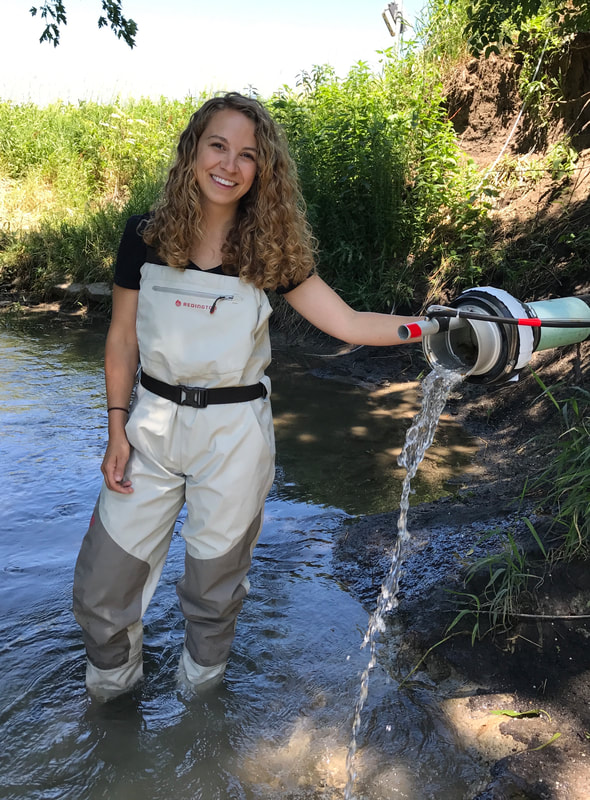To me, ecohydrology is hydrologic research put in the context of living things. It relates the movement and storage of water, as well as the things that are transported by water—nutrients, pollutants, energy—to the ecological consequences of those fluxes and stores. Essentially, by emphasizing interactions between water quality/quantity and ecosystems, ecohydrology makes the connection between hydrologic processes and “why it matters.” This view is certainly biased towards my experiences. However, at its core ecohydrology is a malleable, multi-disciplinary science which seems to continually grow, encompassing more perspectives to achieve an increasingly holistic view of the feedbacks between water and ecosystems.
What are your undergraduate and graduate degrees in?
I received my B.Sc. in Geosciences from Penn State and am currently working on my PhD in Environmental Science at Indiana University, with a focus on hydrology.
How did you arrive at working in/thinking about ecohydrology?
During a prospective student visitation day at Penn State, I was profoundly affected by a statement made by a professor. "For geoscientists," he said, "the outdoors is our laboratory." What began as a desire to work outside while pursuing my degree propelled me into a journey that would lead to a passion for discovery and problem-solving, particularly related to water resources. I had influential mentors who provided opportunities to work in hydrologic systems early in my academic career. As an undergraduate research assistant through the Critical Zone Observatories program, I monitored the effect of dam removal and restoration on groundwater-surface water exchange. As a summer intern with NOAA, I worked to develop techniques to monitor wetland elevation change with respect to rising sea levels. These experiences introduced me to the concept of ecosystem services and the idea that I could contribute to the improved management of natural systems through my research. This led me to pursue a PhD focused on understanding how human modification of landscapes for agriculture alters the transport of water and nutrients to downstream waterways and, in turn, assessing the role of natural systems like floodplain wetlands in transporting and transforming water and nutrients. While I was working on questions related to the effects of hydrological processes on ecosystem functioning all along, I did not identify the research as ecohydrology until later on.
What do you see as an important emerging area of ecohydrology?
I hesitate to call it emerging because I know there are folks doing interesting work in this area, but I think there is a growing call to incorporate ecohydrological principles into decision-making and management of water resources. An exciting challenge will be to develop frameworks that integrate physical and social science, and models that incorporate both ecohydrological processes and social science data. One such approach is to model future scenarios that reflect preferred management choices of landowners and local citizens, as well as policy interventions based on ongoing political and regulatory discussions. These strategies provide an opportunity to view future outcomes, such as land-use changes and implementation of nature-based solutions, through an ecohydrologic lens and could be key to bringing ecohydrology to the forefront of the planning process.
Do you have a favorite ecohydrology paper? Describe/explain.
There are too many great ecohydrology papers to mention! I will highlight one paper that was critical in shaping how I approach ecohydrologic research, especially at the beginning of graduate school: Savenije (2009) “The art of hydrology.” The author discusses how the process of scientific discovery, particularly hydrologic modeling, entails an element of art. Accordingly, it requires “imagination, inspiration, insight, field experience, creativity, ingenuity, and skill”—all qualities primarily associated with the field of art. While this may seem obvious, explicitly recognizing the art in ecohydrology has helped me to embrace this aspect of my role as a scientist, and I believe it is at the heart of addressing issues at the interface of water and living things.
What do you do for fun (apart from ecohydrology)?
When I am not wading through streams or chasing storms to sample, you can find me running or playing the saxophone with local swing/jazz ensembles. I also love to travel. Exploring new places and meeting people continually inspires me. Many of my experiences traveling have been facilitated by research/education, and I have found that the uniting purpose of science is one of the most powerful ways to engage with people and form meaningful connections.

 RSS Feed
RSS Feed